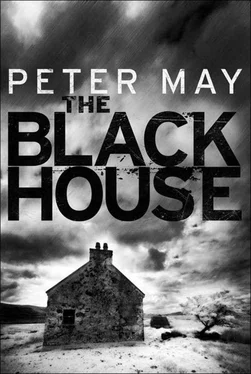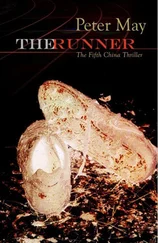Peter May - The Blackhouse
Здесь есть возможность читать онлайн «Peter May - The Blackhouse» весь текст электронной книги совершенно бесплатно (целиком полную версию без сокращений). В некоторых случаях можно слушать аудио, скачать через торрент в формате fb2 и присутствует краткое содержание. Жанр: Триллер, на английском языке. Описание произведения, (предисловие) а так же отзывы посетителей доступны на портале библиотеки ЛибКат.
- Название:The Blackhouse
- Автор:
- Жанр:
- Год:неизвестен
- ISBN:нет данных
- Рейтинг книги:5 / 5. Голосов: 1
-
Избранное:Добавить в избранное
- Отзывы:
-
Ваша оценка:
- 100
- 1
- 2
- 3
- 4
- 5
The Blackhouse: краткое содержание, описание и аннотация
Предлагаем к чтению аннотацию, описание, краткое содержание или предисловие (зависит от того, что написал сам автор книги «The Blackhouse»). Если вы не нашли необходимую информацию о книге — напишите в комментариях, мы постараемся отыскать её.
The Blackhouse — читать онлайн бесплатно полную книгу (весь текст) целиком
Ниже представлен текст книги, разбитый по страницам. Система сохранения места последней прочитанной страницы, позволяет с удобством читать онлайн бесплатно книгу «The Blackhouse», без необходимости каждый раз заново искать на чём Вы остановились. Поставьте закладку, и сможете в любой момент перейти на страницу, на которой закончили чтение.
Интервал:
Закладка:
‘And now you’re just jumping at the chance. A chance to escape. To get away from me.’
‘Oh, don’t be ridiculous.’ But he knew she was right. Knew, too, that it wasn’t just Mona he wanted to run away from. It was everything. Back to a place where life had once seemed simple. A return to childhood, back to the womb. How easy it was now to ignore the fact that he had spent most of his adult life avoiding just that. Easy to forget that as a teenager nothing had seemed more important to him than leaving.
And he remembered how easy it had been to marry Mona. For all the wrong reasons. For company. For an excuse not to go back. But in fourteen years all they had achieved was a kind of accommodation, a space that each of them had made for the other in their lives. A space which they had occupied together, but never quite shared. They had been friends. There had been genuine warmth. But he doubted if there had ever been love. Real love. Like so many people in life, they seemed to have settled for second best. Robbie had been the bridge between them. But Robbie was gone.
Mona said, ‘Have you any idea what it’s been like for me these last few weeks?’
‘I think I might.’
She shook her head. ‘No. You haven’t had to spend every waking minute with someone whose very silence screams reproach. I know you blame me, Fin.’
‘I never said that.’
‘You never had to. But you know what? However much you blame me, I blame myself ten times more. And it’s my loss, too, Fin. He was my son, too.’ Now the tears returned, burning her eyes. He could not bring himself to speak. ‘I don’t want you to go.’ Back to the refrain.
‘I don’t have a choice.’
‘Of course you have a choice. There’s always a choice. For weeks you’ve been choosing not to go to work. You can choose not to go to the island. Just tell them, no.’
‘I can’t.’
‘Fin, if you get on that plane tomorrow …’ He waited for the ultimatum while she screwed up the courage to make it. But it didn’t come.
‘What, Mona? What’ll happen if I get on that plane tomorrow?’ He was goading her into saying it. Then it would be her fault and not his.
She looked away, sucking in her lower lip and biting on it until she tasted blood. ‘Just don’t expect me to be here when you get back, that’s all.’
He looked at her for a long time. ‘Maybe that would be best.’
The two-engined, thirty-seven-seater aircraft shuddered in the wind as it tilted to circle Loch a Tuath in preparation for landing on the short, windswept runway at Stornoway airport. As they emerged from thick, low cloud, Fin looked down at a slate-grey sea breaking white over the fingers of black rock that reached out from the Eye Peninsula, the ragged scrap of land they called Point. He saw the familiar patterns carved into the landscape, like the trenches which had so characterized the Great War, though men had dug these ditches not for war but for warmth. Centuries of peat cutting had left their distinctive scarring on the endless acres of otherwise featureless bogland. The water in the bay below looked cold, ridged by the wind that blew uninterrupted across it. Fin had forgotten about the wind, that tireless assault blowing in across three thousand miles of Atlantic. Beyond the shelter of Stornoway harbour there was barely a tree on the island.
On the hour-long flight, he had tried not to think. Neither to anticipate his return to the island of his birth, nor to replay the dreadful silence which had accompanied his departure from home. Mona had spent the night in Robbie’s room. He had heard her crying from the other end of the hall as he packed. In the morning he had left without a word, and as he pulled the front door shut behind him knew that he had closed it not only on Mona, but on a chapter of his life he wished had never been written.
Now, seeing the familiar Nissen huts on the airfield below, and the unfamiliar new ferry terminal shining in the distance, Fin felt a rush of emotion. It had been so very long, and he was unprepared for the sudden flood of memories that almost overwhelmed him.
TWO
I have heard people who were born in the fifties describe their childhood in shades of brown. A sepia world. I grew up in the sixties and seventies, and my childhood was purple.
We lived in what was known as a whitehouse, about half a mile outside the village of Crobost. It was part of the community they called Ness, on the extreme northern tip of the Isle of Lewis, the most northerly island in the archipelago of the Outer Hebrides of Scotland. The whitehouses were built in the twenties of stone and lime, or concrete block, and roofed with slate, or corrugated iron, or tarred felt. They were built to replace the old blackhouses. The blackhouses had dry-stone walls with thatched roofs and gave shelter to both man and beast. A peat fire burned day and night in the centre of the stone floor of the main room. It was called the fire room. There were no chimneys, and smoke was supposed to escape through a hole in the roof. Of course, it wasn’t very efficient, and the houses were always full of the stuff. It was little wonder that life-expectancy was short.
The remains of the blackhouse where my paternal grandparents lived stood in our garden, a stone’s throw from the house. It had no roof, and its walls had mostly fallen down, but it was a great place to play hide and seek.
My father was a practical man, with a shock of thick black hair and sharp blue eyes. He had skin like leather that went the colour of tar in the summer, when he spent most of his waking hours outdoors. When I was still very young, before I went to school, he used to take me beachcombing. I didn’t understand it then, but I learned later that he was unemployed at that time. There had been a contraction in the fishing industry, and the boat he skippered was sold for scrap. So he had time on his hands, and we were up at first light scouring the beaches for whatever might have washed up in the night. Timber. Lots of timber. He once told me he knew a man who had built his whole house from timber washed up on the shore. He himself had got most of the timber for building our attic rooms from the sea. The sea gave us plenty. It also took plenty. There was barely a month went by when we didn’t hear of some poor soul drowning. A fishing accident. Someone in bathing and dragged out by the undertow. Someone falling from the cliffs.
We dragged all manner of stuff home from those trips to the beach. Rope, fishing net, aluminium buoys that my father sold to the tinkers. Pickings were even better after a storm. And it was after one that we found the big forty-five-gallon drum. Although the storm itself had subsided, the wind was still blowing a gale, the sea still high and angry, and thrashing at the coast. Great ragged clumps of broken cloud blew overhead at sixty miles an hour or more. And in between them, the sun coloured the land in bright, shifting patches of green and purple and brown.
Although the drum was unmarked, it was full and heavy, and my father was excited by our find. But it was too heavy for us to move on our own, leaning at an angle and half buried in the sand. So he organized a tractor and a trailer and some men to help, and by the afternoon we had it safely standing in an outbuilding on the croft. It didn’t take him long to open it and discover that it was full of paint. Bright purple gloss paint. Which is how it came to be that in our house every door and cupboard and shelf, every window and floorboard was painted purple. For all the years that I lived there.
My mother was a lovely woman with tight blond curls that she dragged back in a ponytail. She had pale, freckled skin, and liquid brown eyes, and I can’t ever remember seeing her wear make-up. She was a gentle person with a sunny disposition, but a fiery temper if you got on the wrong side of her. She worked the croft. It was only about six acres, and it ran in a long, narrow strip from the house down to the shore. Fertile machair land that was good grazing for the sheep that brought in most of the croft’s income from government subsidies. She also grew potatoes and turnips and some cereals, and grass for hay and silage. My lasting image of her is seated on our tractor in her blue overalls and black wellies, smiling self-consciously for a photographer from the local paper because she had won some prize at the Ness show.
Читать дальшеИнтервал:
Закладка:
Похожие книги на «The Blackhouse»
Представляем Вашему вниманию похожие книги на «The Blackhouse» списком для выбора. Мы отобрали схожую по названию и смыслу литературу в надежде предоставить читателям больше вариантов отыскать новые, интересные, ещё непрочитанные произведения.
Обсуждение, отзывы о книге «The Blackhouse» и просто собственные мнения читателей. Оставьте ваши комментарии, напишите, что Вы думаете о произведении, его смысле или главных героях. Укажите что конкретно понравилось, а что нет, и почему Вы так считаете.












